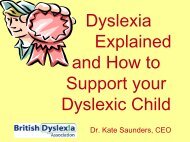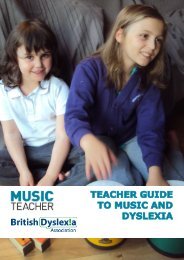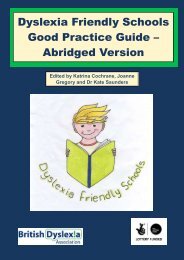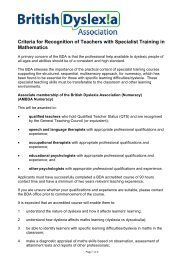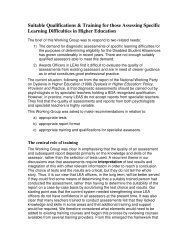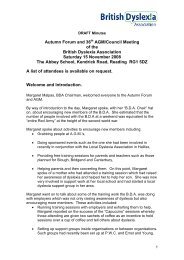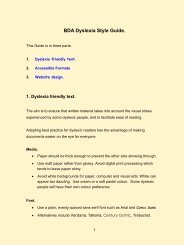Intervention for Dyslexia - The British Dyslexia Association
Intervention for Dyslexia - The British Dyslexia Association
Intervention for Dyslexia - The British Dyslexia Association
You also want an ePaper? Increase the reach of your titles
YUMPU automatically turns print PDFs into web optimized ePapers that Google loves.
in a meta-analysis. However, the averages do take account of non-significant and null<br />
findings from individual studies.)<br />
It should also be noted that, in the majority of cases, the measures yielding positive<br />
results were drawn from Clay’s (1993a) Observation Survey of Early Literacy<br />
Achievement, and only in a few cases were results from independent standardised tests.<br />
Three of the five studies examined the effects of Reading Recovery on letter knowledge,<br />
but only Iversen and Tunmer (1993) found an unequivocally significant positive effect,<br />
which was on the Letter Identification subtest of the Observation Survey. Three of the<br />
studies examined the effects of Reading Recovery on phonics, with Pinnell, DeFord and<br />
Lyons (1988), Iversen and Tunmer (1993) and Schwartz (2005) all reporting significant<br />
positive effects on the Word Recognition subtest of the Observation Survey. Iversen and<br />
Tunmer (1993) also found significant positive effects on two independent measures: the<br />
Dolch Word Recognition Test, and a pseudoword decoding task. In addition, Iversen and<br />
Tunmer (1993) reported significant positive effects on two phonemic awareness<br />
measures, namely a phoneme deletion task and the Yopp-Singer Phoneme<br />
Segmentation Test. Pinnell, DeFord and Lyons (1988), Iversen and Tunmer (1993) and<br />
Schwartz (2005) all reported a statistically significant positive effect on the Concepts<br />
about Print subtest of the Observation Survey.<br />
<strong>The</strong> results <strong>for</strong> fluency and comprehension were more mixed. Schwartz (2005) found<br />
significant effects on the Slosson Oral Reading Test (Revised) and the Text Reading<br />
Level subtest of the Observation Survey. Pinnell, DeFord and Lyons (1988) found a<br />
statistically significant effect on the Reading Comprehension and Reading Vocabulary<br />
subtests of the Comprehensive Test of Basic Skills (CTBS). However, Schwartz (2005)<br />
reported no statistically significant effect of Reading Recovery on the Degrees of Reading<br />
Power Test. In other literacy areas highlighted in the What Works Clearinghouse report<br />
(2007a) some positive effects were noted. Pinnell, DeFord and Lyons (1988), Schwartz<br />
(2005) and Iversen and Tunmer (1993) all found statistically significant effects of<br />
Reading Recovery on two subtests of the Observation Survey: Dictation and Writing<br />
Vocabulary. Pinnell et al. (1994) found significant effects on the Gates-MacGinitie<br />
Reading Test, the Dictation subtest of the Observation Survey, and the Woodcock<br />
Reading Mastery Test (Revised). However, Baenen et al. (1997) did not find a<br />
statistically significant effect of Reading Recovery on grade retention.<br />
It should be pointed out that one of the five key studies featuring in the What Works<br />
Clearinghouse report (2007a) – that by Pinnell et al. (1994) – has been criticised by<br />
Rasinski (1995) on the grounds that instructional time varied across the different<br />
treatment conditions used in the study. <strong>The</strong> What Works Clearinghouse report was only<br />
concerned with Reading Recovery and so did not consider data obtained from the<br />
alternative interventions. However, when instructional time was factored into the<br />
analysis, Rasinski (1995) found that the alternative interventions yielded better<br />
outcomes than Reading Recovery.<br />
Another WWC review (What Works Clearinghouse, 2007b) searched <strong>for</strong> studies<br />
evaluating programmes <strong>for</strong> children in Kindergarten to grade 3 (Years 1-4) intended to<br />
improve achievement in the four domains of alphabetics (phonemic awareness and<br />
phonics), oral reading fluency, comprehension, or general reading achievement. <strong>The</strong><br />
reviewers took in both initial teaching schemes and those intended as catch-up<br />
programmes. <strong>The</strong>y found 887 studies, of which 51 studies of 24 programmes met their<br />
evidence standards, 27 without reservations and 24 with reservations. Of the 24<br />
programmes, at least four are known to be in use in the UK: Accelerated Reader,<br />
Corrective Reading, Reading Recovery, and Success <strong>for</strong> All. Of the 24 programmes, only<br />
<strong>Intervention</strong> <strong>for</strong> <strong>Dyslexia</strong> 103



